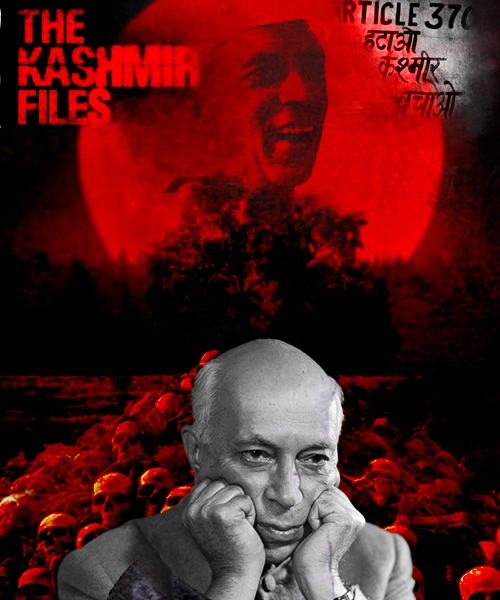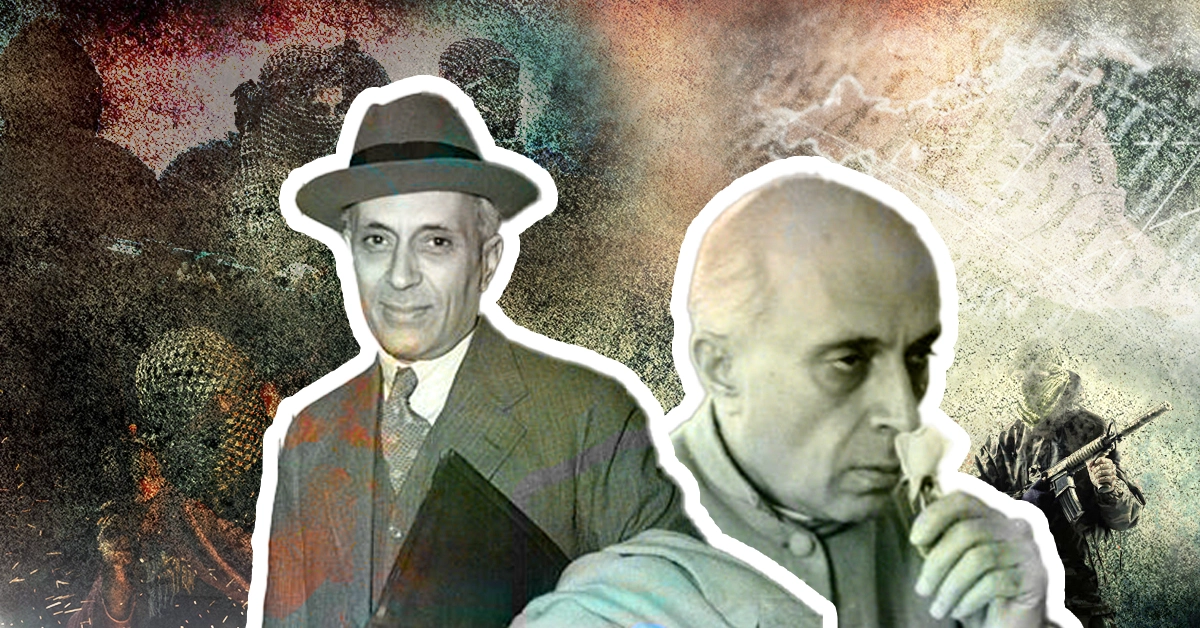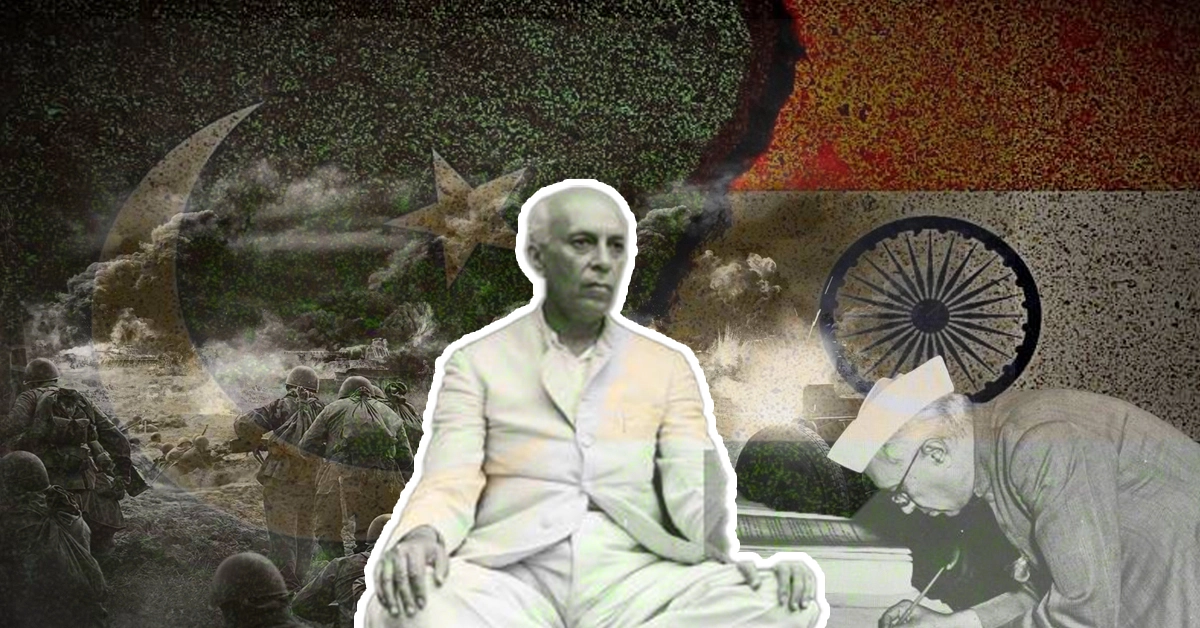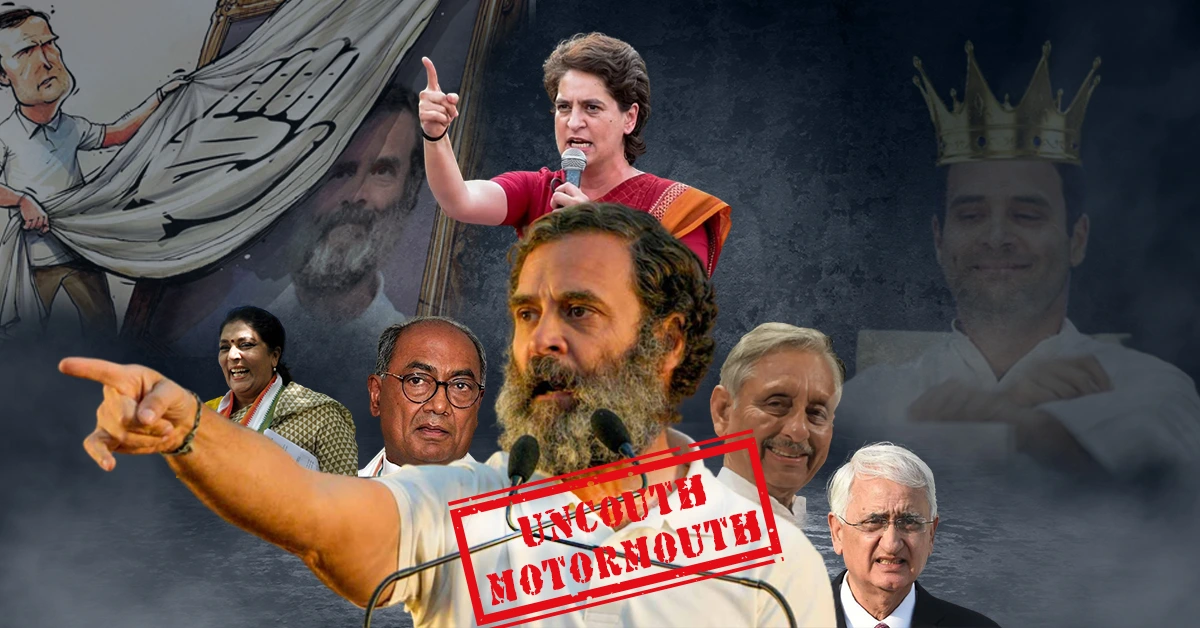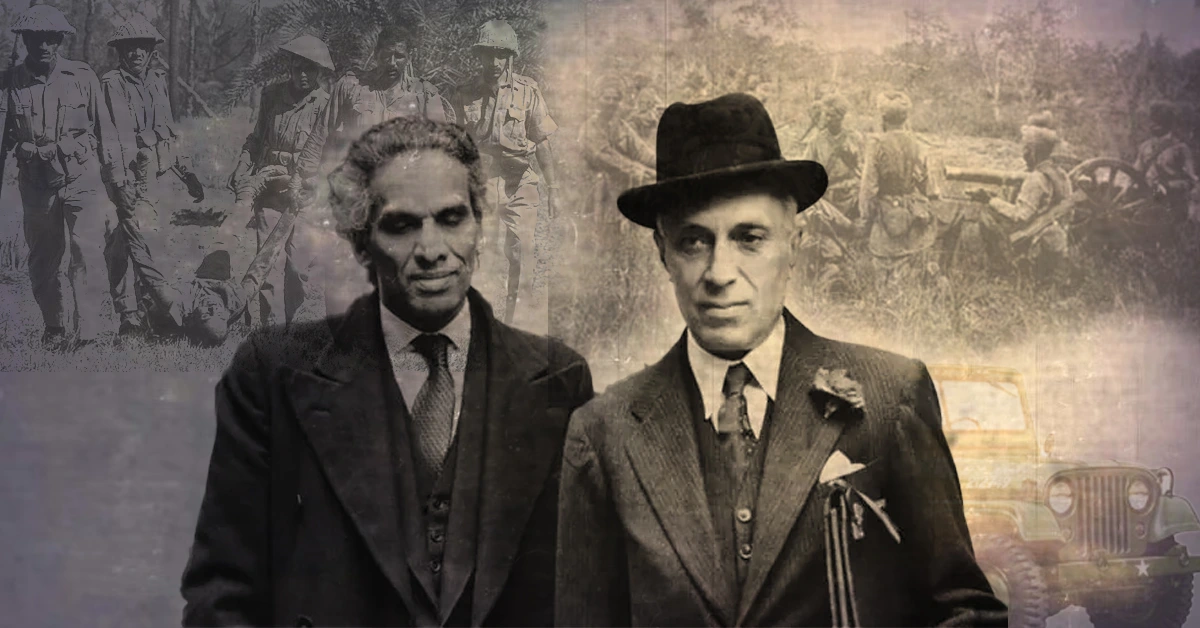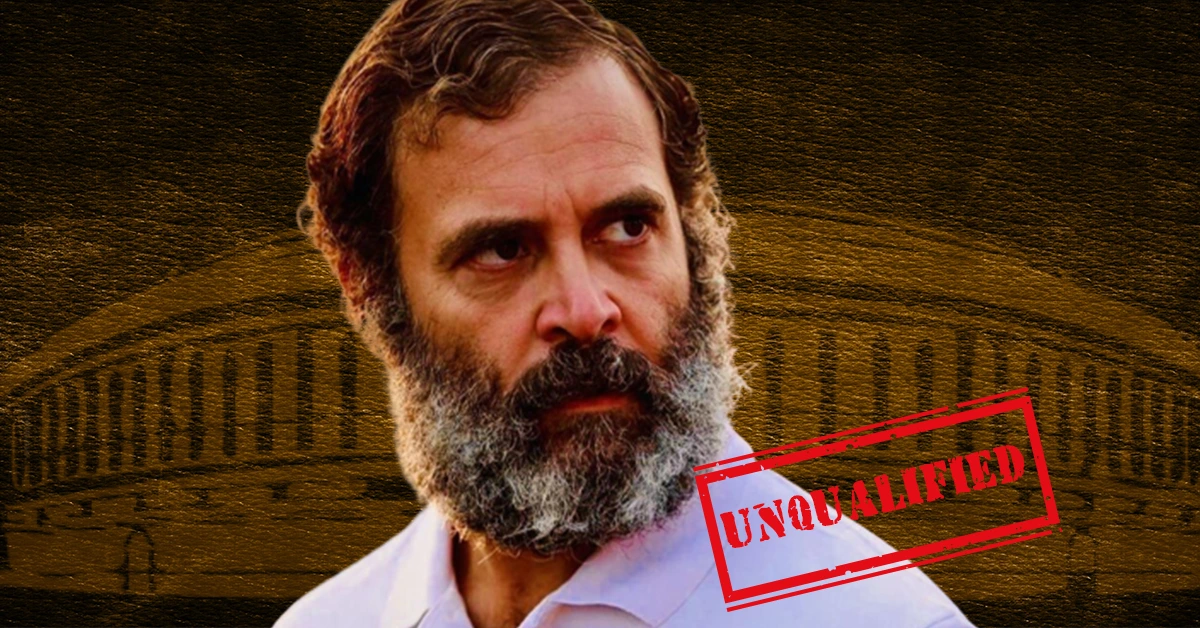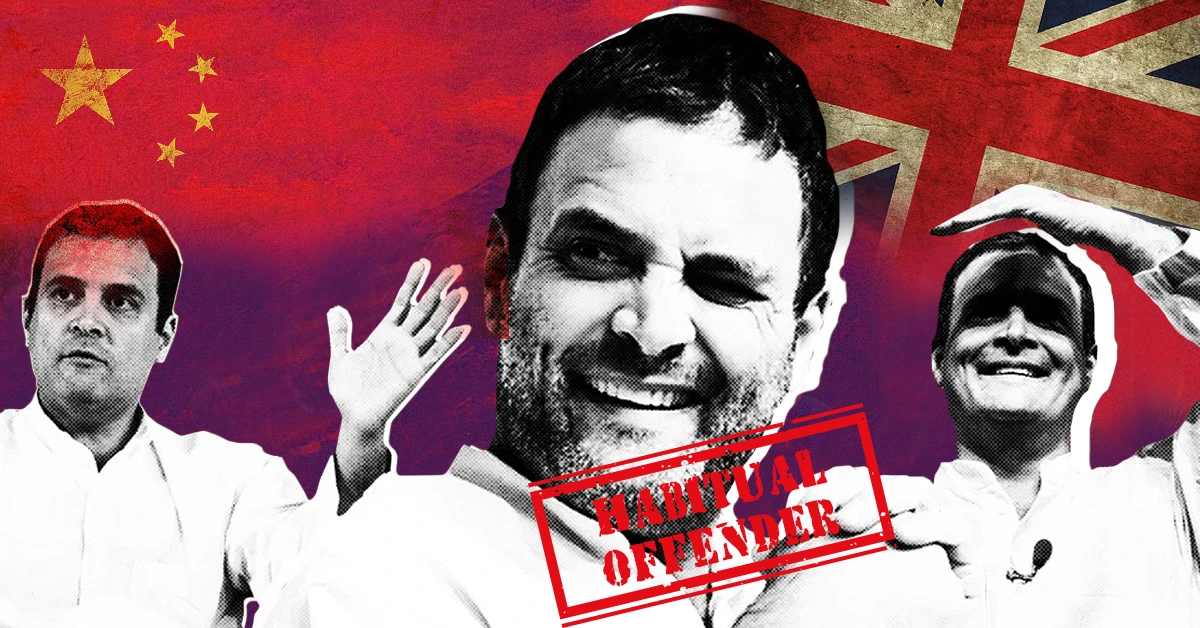The responsibility for taking India’s political discourse to such low levels of civility lies purely with Rahul Gandhi. Rahul Gandhi has been deliberately indulging in these theatrics with a definitive idea of spoiling the country’s public discourse.
- January 4, 2024
- 9 Mins Read
The Himalayan Blunders: The Cost of Nehru’s Ego
(Part IV)
Nehru’s ego-driven decisions, epitomized by Articles 370 and 35A, unleashed a legacy of discrimination and strife in Jammu & Kashmir. This narrative, marked by betrayal and separatism, inflicted profound suffering on citizens, especially the displaced Kashmiri Pandits. Modi’s historic move in 2019, dismantling Article 370, signaled a transformative shift towards unity and progress.
click play to listen to the article
यः सर्वदा द्वेषं धारयति, स एकः मधुरहीनो मधुकरः विचलति।
The one who harbors constant negativity goes astray like a bee without honey
Jammu and Kashmir was the only State with which Nehru dealt with himself directly and did not allow Sardar Patel to interfere although he was the Home Minister of India. Kashmir burnt and burnt because of the faults and ego of Nehru and Nehru alone. The entire Kashmir mess deserves to be unreservedly be put at Nehru’s doorstep.
Nehru consistently mishandled the Kashmir issue, treating it as a personal affair rather than heeding the rational advice of his colleagues. His priority was installing his friend Sheikh Abdullah in power, overshadowing the crucial task of integrating Kashmir firmly into India. Nehru deliberately differentiated Jammu and Kashmir from other Princely States that acceded to India, favoring his personal interests over national unity.
Jammu and Kashmir was the only State with which Nehru dealt with himself directly and did not allow Sardar Patel to interfere although he was the Home Minister of India. To snatch this matter out of the hands of the Home Ministry, Pandit Nehru, strangely, brought the issue under the purview of the Ministry of External Affairs. His decision to personally oversee the accession of Jammu and Kashmir reflected a serious misjudgment, driven by his alignment with Sheikh Abdullah’s political ambitions, which clashed with Sardar Patel’s vision of a single unified nation. This self-serving approach led to disastrous consequences, undermining the broader goal of forging a strong and united India. Kashmir burnt and burnt because of the faults and ego of Nehru and Nehru alone. The entire Kashmir mess deserves to be unreservedly be put at Nehru’s doorstep.
Legacy of Betrayal: Article 370 & Article 35A: Emboldened by Nehru’s willingness to go to any lengths for the sake of his friendship, Sheikh Abdullah started showing his true colors openly. He asserted that an independent Kashmir should be guaranteed not only by India and Pakistan but also by Britain, the United States, and other members of the United Nations. Adding insult to injury, he reminded everyone of Nehru’s insistence that the Maharaja’s accession was provisional, leaving the decision of whether Jammu and Kashmir would remain an integral part of India or become part of Pakistan to the people. Nehru, in a display of utter incompetence and blatant disregard for the nation’s interests, shamefully sided with Sheikh Abdullah. Driven by his ego and personal biases, Nehru’s misguided decisions further muddled an already complex situation, contributing to the unfolding disaster in the region.
During the Constitution-making process, Nehru adamantly advocated for granting special status to Kashmir, ignoring the vehement objections of Ambedkar and Sardar Patel. Ignoring their vehement objections, Nehru introduced Article 306A (later morphed into Article 370) through Gopalaswami Ayyangar, who was handpicked by Nehru himself by conveniently sidelining Patel, to oversee Kashmir matters. Strikingly, this draft faced widespread rejection, with only Ayyangar and Maulana Abul Kalam Azad in favor. True to his utter disregard for democratic principles, Nehru urgently summoned Patel to clean up the mess, insisting that he resolve the matter to safeguard Nehru’s personal reputation, given his prior commitment to Sheikh Abdullah. Nehru’s actions, shrouded in secrecy and devoid of concern for India’s sovereignty, led to the establishment of Article 370. In 1954, continuing his legacy of flawed decisions and autocratic tendencies, Nehru extended his legacy by introducing Article 35A as an offshoot of Article 370. Learning from the resistance he encountered during the introduction of Article 370, and with Sardar Patel long dead, Nehru opted to bypass the Indian Parliament altogether. He discreetly ushered in Article 35A through a Presidential order, strategically concealing it in Appendix I rather than incorporating it into the main body of the Constitution. These moves institutionalized a separatist mindset which hung like a noose around India’s neck—a grim testament to Nehru’s misguided and self-serving decisions.
"If non-Muslims wish to reside in Kashmir, they should align with the National Conference or choose to leave the country. The National Conference is the genuine national organization, and even without a single Hindu becoming a member, it will remain so. Should the Pandits opt not to join, no safeguards or considerations will shield them. - Jawaharlal Nehru
The Cost of Nehru’s Ego: Articles 370 & 35A created a large number of problems. The citizens of India were ruthlessly relegated to the status of “non-residents” in Jammu & Kashmir, where a system systematically eroded the rights of non-residents, despite being Indian citizens, denying them the ability to own property, pursue government employment, or access government scholarships or assistance in the state. Even those who chose to still reside there were stripped of their fundamental right to vote.
Article 35A further intensified the plight of the indigenous Hindu Kashmiri Pandit population, already victims of ethnic cleansing. Stripped of their permanent residency, this community lost their properties, also solidifying a drastic demographic shift that significantly diminished the Hindu population in the state to a mere fraction.
Women in the state were handed state subject certificates, valid only until marriage. Those who dared to marry outside the state were cruelly deprived of their property rights and inheritance from their parents. Legal safeguards against domestic violence were conspicuously absent. Muslim Kashmiri women were denied the protections afforded by Indian law against triple talaq.
Child marriage, the Right to Education, and protections for scheduled tribe communities were neglected, perpetuating a cycle of generational subjugation. Even the descendants of sweepers were condemned to a life of sweeping, regardless of their educational achievements. The Valley was deliberately shielded from the beneficial provisions of laws such as Wealth Tax, Gift Tax, and the Urban Land Ceiling Act. To compound the severity of the situation, many of India’s anti-corruption laws were rendered inapplicable in Kashmir, magnifying the profound and far-reaching negative consequences of this discriminatory legal framework to an even graver extent.
Article 370 did not benefit the Kashmiri people; instead, it served as a golden ticket for the ruling political elite. Politicians shamelessly wielded the bogey of Article 370 to sow the seeds of separatism, ensuring their own political longevity. This provision not only institutionalized but also constitutionally legitimized separatism, effectively creating a psychological divide between Kashmir and the rest of India. Article 370, besides being a blueprint for national disintegration, set a nefarious example for other elements, like the Khalistanis, to come up with similar demands. It is a stark reminder of how political expediency can take precedence over the welfare of the people, leaving a trail of devastation and communal strife in its wake.
Ambedkar and Sardar Patel had cautioned Nehru about the repercussions of introducing Article 370. In response to the drafting of Article 370, Patel wrote to Gopalaswami Ayyangar regarding Sheikh Abdullah, stating, “he (Sheikh Abdullah) owes a duty to India or to the Indian Government, or even on a personal basis, to you and the Prime Minister who have gone all out to accommodate him. In these circumstances, any question of my approval does not arise; if you feel it is the right thing to do, you can go ahead with….” However, Nehru absolved himself of all responsibilities when things started going wrong. Astonishingly, and indicative of Nehru prioritizing himself and his ego above all else, after Patel’s death, Nehru falsely informed the Parliament in 1952 that Patel was in favor of Article 370. Even Nehru’s chosen associate, Gopalaswami, expressed anger, remarking, “It is an ill-return to Sardar for the magnanimity he had shown in accepting Panditji’s point of view against his better judgment.”
Overcoming the Shadows of Article 370: Nehru’s blunders haunted India for the next seven decades, with over 70,000 lives lost to jihadi terrorism — a toll that can be traced back to Nehru’s Himalayan blunders and the cost of his ego.
Across seven decades and generations, the weight of one man’s blunders cast a long shadow of missed opportunities. However, on 5 August 2019, history took a momentous turn. In a departure from the past, “India First” became the guiding principle for the New India envisioned by Prime Minister Narendra Modi. PM Modi untangled the web of blunders that had burdened India since 1947. Article 370 was dismantled, weaving Jammu, Kashmir, and Ladakh seamlessly into the fabric of India, promising a future where they would never be torn apart again.
Across seven decades and generations, the weight of one man’s blunders cast a long shadow of missed opportunities.
Nehru’s blunders haunted India for the next seven decades, with over 70,000 lives lost to jihadi terrorism — a toll that can be traced back to Nehru’s Himalayan blunders and the cost of his ego.
Article 35A further intensified the plight of the indigenous Hindu Kashmiri Pandit population, already victims of ethnic cleansing. Stripped of their permanent residency, this community lost their properties, also solidifying a drastic demographic shift that significantly diminished the Hindu population in the state to a mere fraction.
Women who dared to marry outside the state were cruelly deprived of their property rights and inheritance from their parents.
Article 370 served as a golden ticket for the ruling political elite who used it to sow the seeds of separatism.
Read Earlier Parts
Part - I
Nehru’s abysmal leadership, marred by a servile attitude toward British interests, a blatant disregard for Maharaja Hari Singh’s desperate pleas, and a criminally negligent delay in responding to the Pakistani invasion, inflicted irreversible damage on India. His self-serving actions spawned doubt, separatism, and bloodshed, creating a regrettable and tumultuous legacy that continues to haunt the nation.
Part - II
In 1947, Nehru’s meddlesome actions in Jammu and Kashmir marked a colossal blunder, prioritizing personal agendas over India’s security. His reckless promises, callous disregard for Maharaja Hari Singh’s pleas, and the disastrous ceasefire in 1948 allowed Pakistan to seize strategic regions, paving the way for future conflict and the rise of jihadist terrorism. Nehru’s egoistic choices inflicted profound and enduring pain on India, with the forced exodus of Kashmiri Hindus and the loss of innocent lives as grim reminders of his misguided leadership.
Part - III
In the aftermath of partition, Nehru’s catastrophic decisions on Kashmir showcased a stunning lack of foresight and spine. His pathetic reliance on British advice and the premature ceasefire exposed a feeble leader prioritizing personal agendas over national interests. Nehru’s betrayal of Hindu concerns, particularly the callous dismissal of Kashmiri Pandits, and his nauseating alliance with Sheikh Abdullah demonstrated a spineless surrender to divisive politics, leaving an indelible stain on India’s history.
Share this article:
Leave a Comment
Recommended For You
Speaking out against Nehru's lingering influence is essential. His reign planted the seeds of corruption, with entitlement overshadowing merit and dynasty prevailing over democracy. The parallel between Nehru's era and Sonia-Rahul Gandhi's is uncanny. The thread of corruption persists, a sinister legacy passed through generations.
The people of the country found Damocles sword hanging over their heads during Congress tenures. The Congress tenure must serve as a reminder to us that never again shall we allow our fate to be put in the hands of such evil forces. Never ever!
More than 30 lawmakers have been disqualified in the last 9 years the way Rahul Gandhi has been. Unable to get himself or his party elected through legit, moral and democratic ways, Rahul Gandhi has resorted to spreading falsehood and divisiveness in an attempt to regain control of the country →Read More →
Rahul Gandhi has the habit of making fabricated allegations beyond facts. There are several instances, besides him lying, where Rahul Gandhi has chosen to willingly undermine India’s sovereignty.
The Lutyens believes their visceral hatred for PM Modi gives them the ticket to use any means to destabilize the country in order to weaken Modi. But in spite of all the attempts by this syndicate, Modi has successfully managed to bring in transformation that India much needed.
Rahul Gandhi believes it's his birthright to rule over India. He has a habit of making fabricated allegations beyond facts. Each of his narratives are coated with arrogance and ego and often undermine India's sovereignty. Now it’s for the people of the country to decide if the self-proclaimed monarch should →Read More →
The Congress and its Lutyens cabal do not for a moment think before tarnishing India’s image — for, for them, removing Modi and plunging India back to the old corrupt political continuum is the only mode of survival.
Rahul Gandhi’s modus operandi has remained the same — propagating lies, making baseless accusations and spreading false narratives with the intent to tarnish Narendra Modi’s image. But every time he tries doing it, he falls flat on his face.
Maharashtra has only moved backward under Uddhav Thackeray's Maha Vikas Aghadi. For the state of Maharashtra to get its growth story back the MVA government must go. Shiv Sena must go. Nationalist Congress Party must go. Congress must go.

